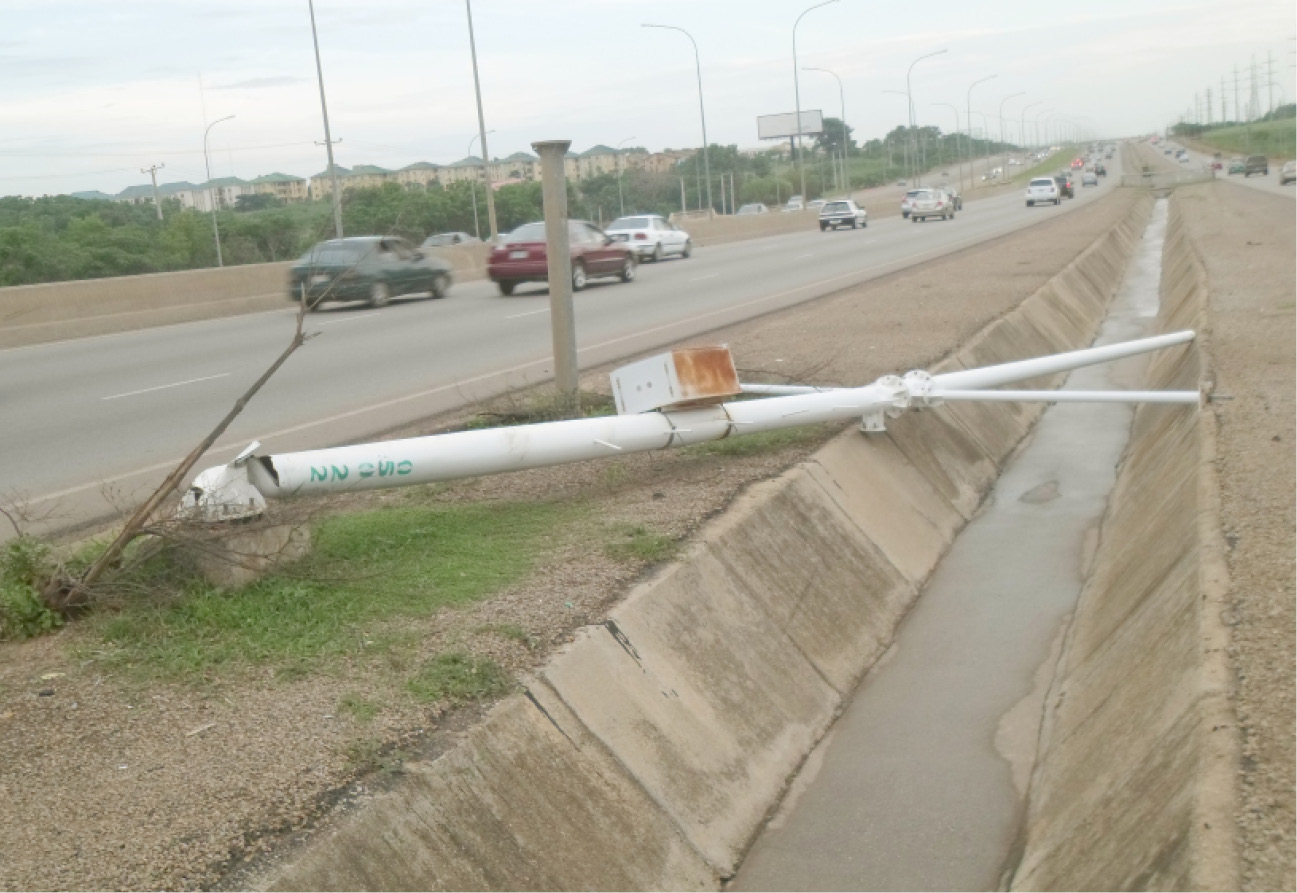Vandals on rampage in Abuja
Vandalisation of public utilities in major districts of the capital city has continued unabated despite efforts by the FCT Administration to curb the menace. Road signs, sinkhole covers, CCTV cameras and panels, bus-stop stands and street light poles, among others are vandalized across the city, causing the (FCTA) millions of naira and making life inconvenient […]

A vandalised CCTV pole near the National Park on Airport Road, Abuja
Vandalisation of public utilities in major districts of the capital city has continued unabated despite efforts by the FCT Administration to curb the menace.
Road signs, sinkhole covers, CCTV cameras and panels, bus-stop stands and street light poles, among others are vandalized across the city, causing the (FCTA) millions of naira and making life inconvenient for residents.
Aso Chronicle observed that a CCTV installation was vandalized at Airport Road in Abuja. The miscreants cut down the pole and removed the cameras, batteries, controllers, transmitters and solar panels.
Our reporters observed similar scenes near the Nigeria Police Force Headquarters, Court of Appeal, National Stadium and National Hospital.
Along Asokoro-Nyanya expressway, too, hoodlums had cut down some street light poles and made away with them, leaving the road in darkness at night.
In other places, the metal pipes holding road signs are also vandalized by miscreants who, it was gathered, sold them as scrap to ironmongers.
Similarly, tents provided by the Nigeria Police for policemen against rain and the sun have not been spared in the wave of vandalisation. The tent directly opposite the National Judicial Institute, (NJI) has also been vandalised by the hoodlums.
It was observed that electricity transformers have also been vandalised, even in highbrow areas like Maitama.
Public conveniences in Jabi Lake have also not been spared as the toilets, washbasins, electrical fittings among others have all been removed.
The metal covers of water drainage or sinkholes have been vandalized in most parts of the metropolis. Many people have fallen into the holes ending either with dislocated ankles or knees or fractured limbs.
Uncompleted buildings are also targets of the vandals who remove items like steel, metal, aluminium and plastics to sell to scrap dealers.
When contacted, a scrap collector in Jabi, who prefers anonymity, said they usually buy what scavengers, otherwise called ‘babanbola’, bring to them to sell. He said the scrap was sold to recyclers outside Abuja.
He explained that Abuja was a city of influential people where a building could be pulled down and the scraps sold at give-away prices by the demolishing authorities which they bought and sold to recyclers, claiming that they wouldn’t know which was not from vandalised property.
Speaking, the Coordinator, Abuja Metropolitan Management Council (AMMC), Umar Shuaibu, said vandals had wrecked utilities worth billions of naira in the FCT.
He said there are challenges in dispensing justice when the vandals were arrested and charged to court. “We have many of these stolen drainage covers caught with the suspected thieves that were charged to court but for the past three years the suspects are yet to be convicted. All this while, the case has been suffering so many unnecessary adjournments.
“Though the stolen items clearly bear the inscription of the authority, the suspects claim they were theirs. Thus the recovered items could not be returned for further use, otherwise our evidence could be lost,” he said.
“If after all this while these suspects are not convicted, we do not have any cause not to believe that justice delayed is justice denied, that our judicial system encourages the suspects to continue with their thefts unabated,” he added.
He, however, said incidences of vandalism had reduced significantly, at least, compared to the recent past. “But the sophistication has increased, from just acts of vandalism to full-fledged armed operations with sophisticated fire arms. This is because of the stiffer resistance the thieves encounter from the security agencies, which has resulted in many arrests.
“In the past it was not as complicated. This only points to the fact that there are people whose means of livelihood depend on proceeds from the theft of public facilities. Hence they resort to do or die operations,” Shuaibu said.
